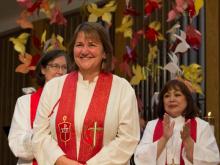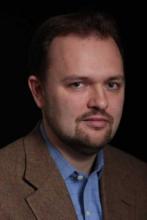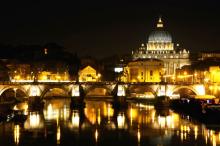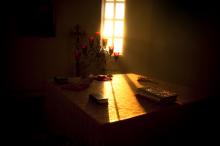schism

Differences in the body of Christ over ethical and theological issues have been with the church since its inception. The letters of the New Testament and ministry of its first leaders were focused on how we live together in the face of inevitable tensions. Our call is to display an outpouring of humility, a commitment to the well-being of other brothers and sisters, and a self-giving love that builds a community truly shaped by the Spirit and acting as a corporate body infused with the love of Jesus.

The head of the United Methodist Church’s Council of Bishops said the election of its first openly lesbian bishop last week “raises significant concerns and questions of church polity and unity.”
Bishop Bruce Ough, president of the Council of Bishops, said the executive committee of the bishops’ council “is monitoring this situation very closely.” The bishops are gathering July 19-20 in Chicago as part of the commission on sexuality called for by the General Conference.

Many conservative Catholics have long viewed Pope Francis with suspicion thanks to his effort to shift the church’s focus away from a culture war agenda and toward a more welcoming approach and a greater emphasis on serving the poor.
But last month’s controversial Vatican summit on the modern family, with the push by Francis and his allies to translate that inclusive view into concrete policies on gays and divorced and remarried Catholics, for example, seems to have marked a tipping point, with some on the right raising the specter of a schism — a formal split that is viewed as the “nuclear option” for dissenters.
New York Times columnist Ross Douthat, a Catholic and a conservative, crystallized the peril in an Oct. 25 column warning the pope not to “break the church” to promote his goals, saying that if Francis continues to alienate conservative Catholics it could lead to “a real schism.”
Douthat had raised the possibility of “an outright schism” earlier this year, as well, and his warnings have been echoed by a number of other church leaders and commentators. The anxiety on the right has also drawn increasing media speculation about the possibility of conservatives splintering off.
So is a schism, with its echoes of medieval debates and heretics burning at the stake, a realistic possibility? And can an independent Catholic church be successful in the modern world?

Influential church historian Diarmaid MacCulloch said he believes Christianity faces a bright future, but predicted the Roman Catholic Church will undergo a major schism over its moral and social teaching.
"Christianity, the world's largest religion, is rapidly expanding — by all indications, its future is very bright," said MacCulloch, 60, professor of church history at Oxford University and an Anglican deacon. His latest book, Silence in Christian History, will be published in the fall by Penguin.

A Virginia judge has ordered seven congregations that broke from the Episcopal Church to return all property to the local diocese — from valuable land to sacred chalices — by April 30.
The Diocese of Virginia had wanted the properties returned by March 30, a week before Easter. But Fairfax County Circuit Court Judge Randy Bellows agreed to give the breakaway congregations more time.
In a closely watched case that reached the Virginia Supreme Court, Bellows ruled in January that congregations had the right to leave the Diocese of Virginia, but not to take church property with them.

The question now is whether these breakaway groups signal a seismic shift in American Protestantism, or just a few fissures in the theological terrain.
In some ways, the rifts are nothing new. American Protestants have been splintering since Roger Williams left Plymouth Colony in the 1630s, said Nancy Ammerman, a sociologist of religion at Boston University.
Yet the schisms counter a 20th-century trend in which ethnic and regional Protestant groups merged to form big-tent denominations such as the ELCA and PC(USA).
"What we may be experiencing at this point is the limit of that movement to draw a lot of diversity under one umbrella," said Ammerman, author of Pillars of Faith: American Congregations and Their Partners.
The saga of the Anglican Mission in the Americas sounds like the words to an old country song: "Why have you left the one you left me for?"
Founded by breakaway Episcopal priests who left their former denomination because they felt it was too liberal, the Anglican Mission is now in the middle of another ugly church feud.
Last time the fight was over sex and salvation. Now the fight is over money and power, between the Anglican Mission's U.S. leaders and the overseas Anglican group that adopted them.
"It's like my mom and dad just told me they are getting a divorce," said the Rev. Brian Hardin, pastor of the Four Winds Mission in Spring Hill, Tenn., which is a member of the Anglican Mission.